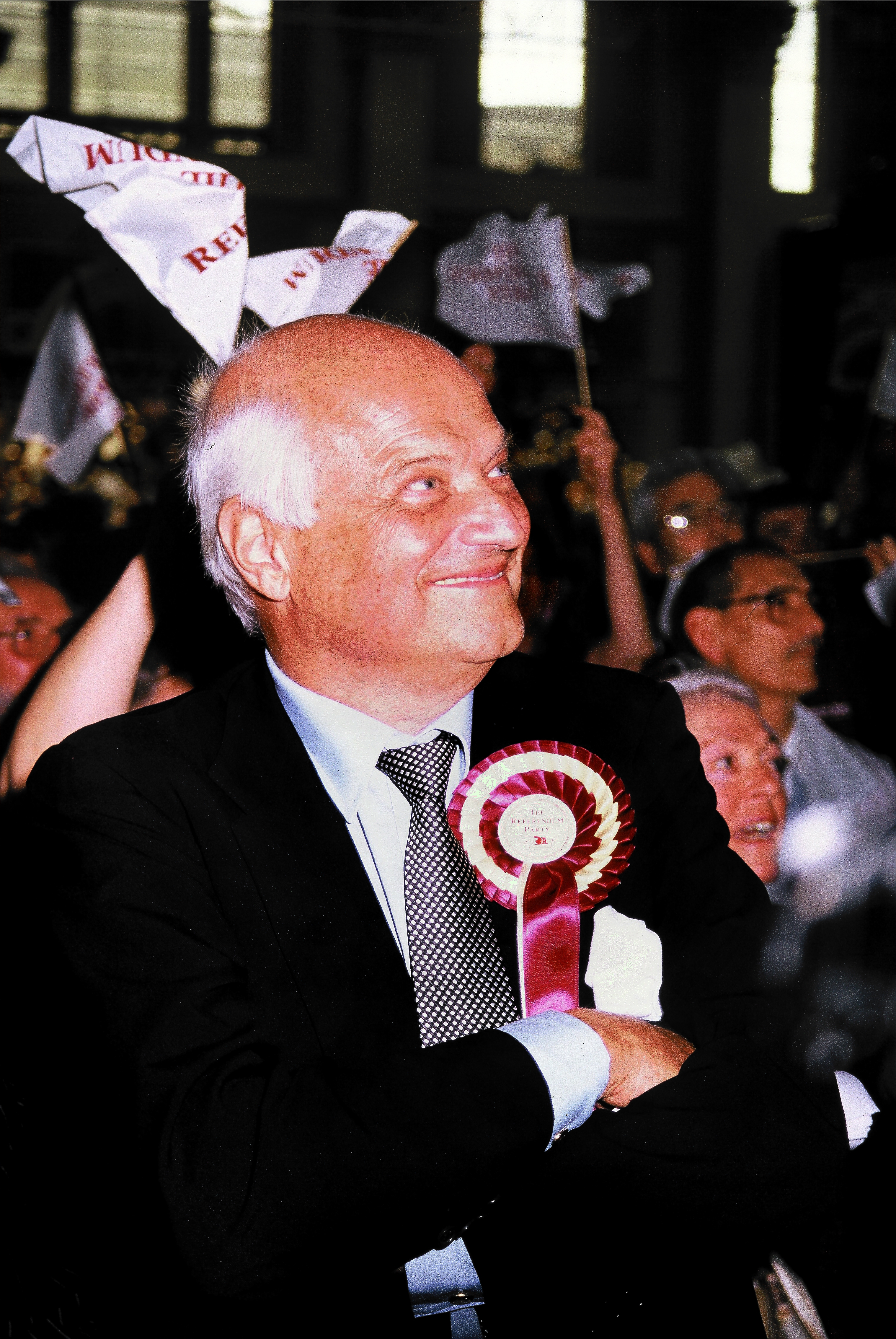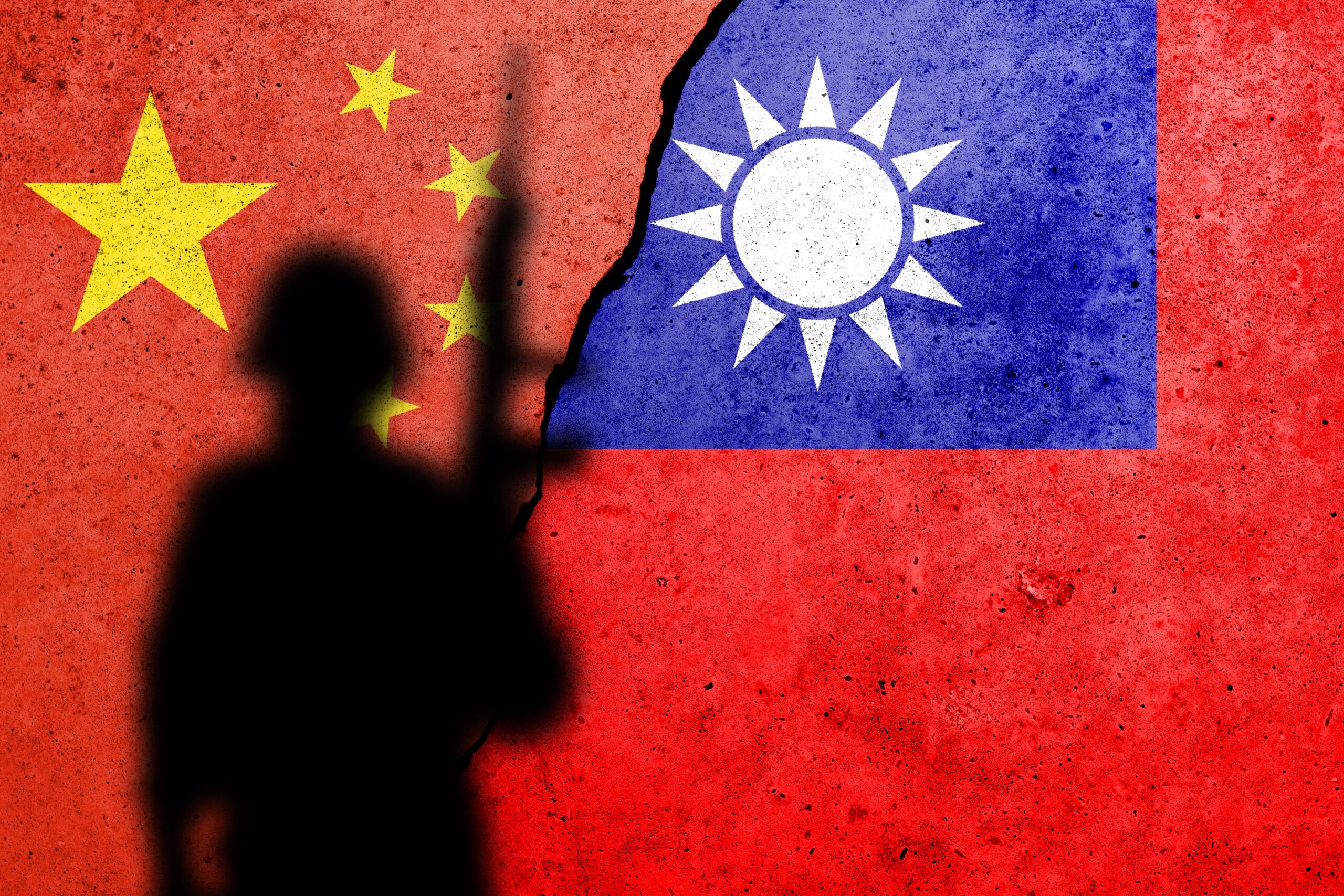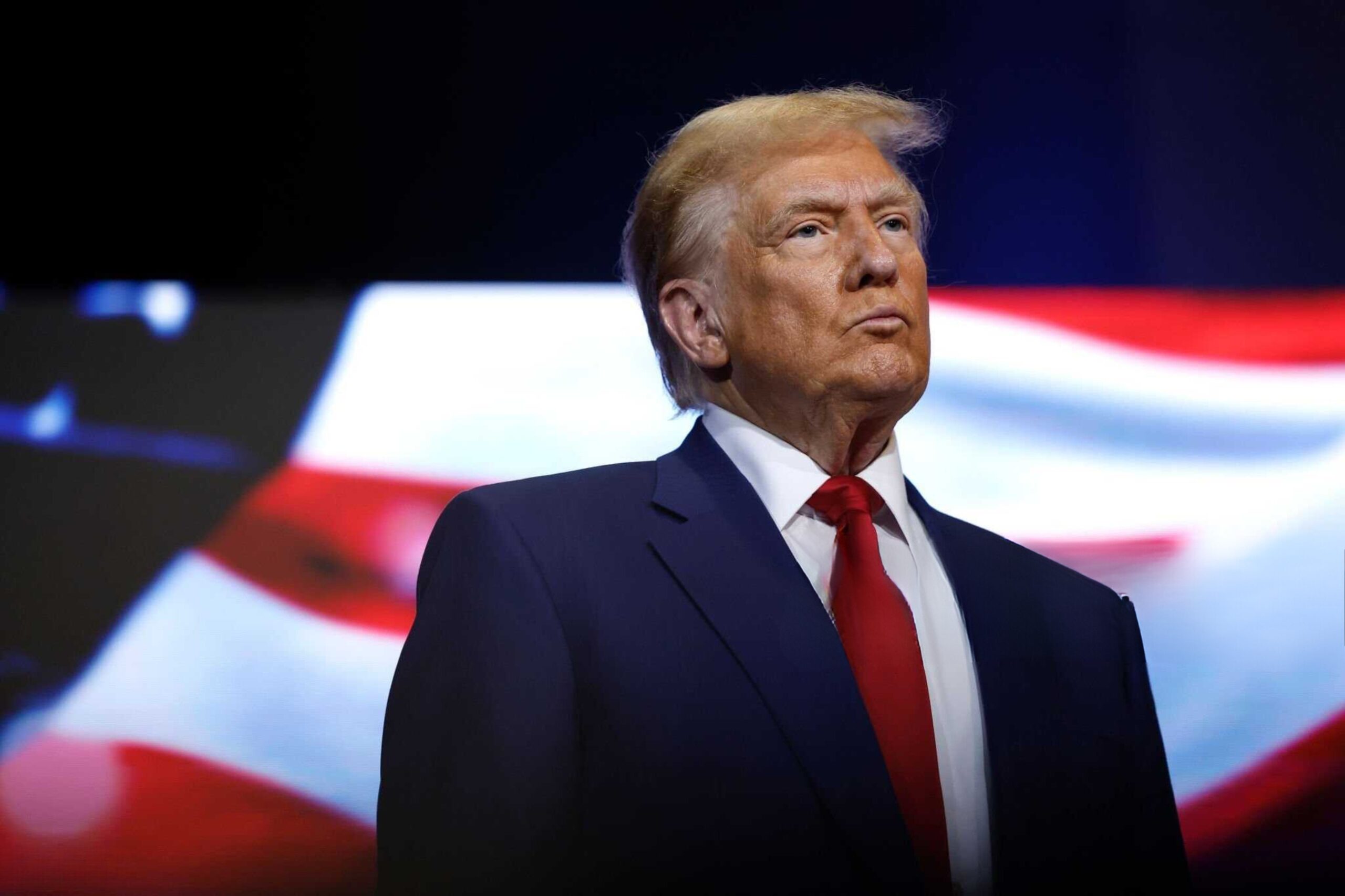|
Getting your Trinity Audio player ready...
|
In the annals of late 20th-century finance and politics, few figures stand out as vividly as Sir James Goldsmith, widely known to his business rivals and the British public alike as ‘Sir Jimmy’. A billionaire financier turned political activist, Goldsmith’s journey from the boardrooms of high finance to the forefront of anti-globalization discourse is a testament to his powers of foresight and deep intellectual complexity.
Decades before the seismic shifts caused by Brexit and the rise of European and American populist movements, Goldsmith warned of the societal upheavals that unchecked globalization would unleash on Western, industrialized societies and the economically developing world alike.
Goldsmith was convinced that Western nations were committing a profound mistake by uncritically embracing the ideology of free trade and creating a global bureaucracy (e.g. the World Trade Organization) to manage it. Goldsmith presciently warned that de-industrialization, social crisis, and political upheaval would follow.
Goldsmith made his warnings in the late 1980s and early 1990s, but the Western World has only begun to grapple with the real-world impact of his ideas over the past decade as rapid deindustrialization, the rise of China, and surging nationalism in the U.S. and Europe have altered the political landscape. The events of recent years have confirmed Sir James Goldsmith as populism’s unlikely prophet.
An Unlikely Prophet
The fact that Goldsmith predicted these events decades ago makes him a true prophet of our time. But if Goldsmith was a prophet, he was also Populism’s Unlikely Prophet — a visionary whose warnings were once dismissed but now ring alarmingly true.
Most anti-globalization leaders have hailed from the far left or the far right, drawing on either Marxism or strains of fascist thought to fashion their diatribes against unchecked capitalism. By contrast, Sir Jimmy was an urbane cosmopolitan who owned and operated a multi-national business empire and who was totally at ease in elite circles.
What made Goldsmith different from his peers was that he never felt completely safe and secure among the elite, even as he was a member of it. Populism’s Unlikely Prophet, Sir Jimmy understood that power is always in play, and the fortunes of individuals—as well as those of entire societies—can swiftly turn on a dime. Unlike others in his class, Populism’s Unlikely Prophet sensed the growing disconnect between the ruling class and the everyday citizen. It’s precisely this awareness that solidified his place in history as Populism’s Unlikely Prophet—a man ahead of his time, warning of the instability that complacency can invite.
A Storied Background, and a Headlong Flight
Born in Paris in 1933, James Goldsmith sprang from a storied lineage that intertwined both Jewish and Catholic heritage. His father, Frank Goldsmith, was a luxury hotel owner and former Conservative Member of the British Parliament who hailed from a Jewish family, while his mother, Marcelle Moullier, came from a long line of ardent French Catholics.
The Goldschmidts, from whom the Goldsmiths descended, had been a family of prominent German-Jewish bankers from Frankfurt, historically intertwined with the illustrious Rothschild banking clan who rose to prominence in the 18th and 19th centuries. Banking brought the Goldschmidts from Germany to Great Britain at the tail end of the 19th century, and they decided to remain.
Raised initially in France due to this father’s business interests on the Continent, James Goldsmith’s early life was disrupted by the onset of World War II. In 1940, as French military resistance collapsed under the blitzkrieg and the forces of Nazi Germany advanced into France, the Goldsmiths fled to the United Kingdom, leaving behind their French properties and businesses. These were swiftly confiscated by the Nazis.
The jarring experience of forced displacement and geopolitical upheaval strongly influenced Goldsmith’s later views on the importance of national sovereignty and cultural identity as mighty forces shaping individuals and nations. He would never forget his headlong flight from France at age 7 with the Nazi war machine breathing down his neck.
From Precocious Schoolboy to Swashbuckling Financier
Educated at Eton College, Goldsmith’s entrepreneurial spirit emerged early. At 16, he dropped out of school after winning a substantial sum on a horse racing bet, declaring cheekily that “a man of my means should not remain a schoolboy!”
After a brief stint in the British army, Goldsmith ventured into various businesses, from pharmaceuticals to publishing, earning a reputation as a canny entrepreneur and later, as a formidable corporate raider.
He began by running a successful pharmaceuticals business in France, capitalizing on diet pill trends in the 1950s. His early ventures demonstrated both his entrepreneurial instincts and his willingness to take risks.
By the 1960s, Goldsmith had expanded into the broader food and consumer goods industries, acquiring companies and turning struggling businesses into profitable enterprises. His reputation as a corporate raider grew during this time, as he used aggressive tactics to take over firms and restructure them for maximum profitability.
In the 1970s and early 1980s, Goldsmith became a one-man financial powerhouse, orchestrating a series of high-profile corporate takeovers in Europe and the United States. He leveraged innovative financial strategies, including leveraged buyouts, to acquire and restructure companies such as Cavenham Foods, Grand Union supermarkets, and Diamond International, among others.
His business empire eventually spanned multiple industries, from publishing to food distribution. His reputation as a ruthless corporate raider was solidified when he launched a hostile bid for the media conglomerate The Goodyear Tire & Rubber Company in the 1980s, though he ultimately withdrew after securing a lucrative settlement.
A Personal Life Marked by Early Tragedy
While Goldsmith’s business career was defined by continuous success, his personal life was marked by a notable early loss. When Goldsmith was 21 years old, tragedy struck when his first serious romantic partner, María Isabel Patiño, a Bolivian heiress, died in childbirth in 1954 while giving birth to their daughter, Isabel.
Given that she was one of the wealthiest young women of her time, with access to top-tier medical care, Maria Patino’s death was strikingly unusual. Goldsmith was reportedly shattered by his romantic partner’s untimely end. It is likely that this tragic event reinforced Goldsmith’s sense of life’s unpredictability and his belief in the fragility of human existence.
Goldsmith’s later conviction that rapid economic and social changes destabilize societies may have partly stemmed from a personal understanding of how seemingly secure circumstances can unravel in an instant. The shock of Maria’s death may also have led Goldsmith to develop a certain skepticism toward blithe assumptions of progress and inevitability—qualities that would later define his contrarian approach to politics.
A Restless Tycoon, Wary of Elite Complacency
Goldsmith’s financial conquests, spanning industries from food to media, made him both a billionaire and a fixture in international high society by the late 1970s. But despite his growing wealth and influence, Goldsmith never felt that he could settle down as a member of the British upper class.
Goldsmith remained wary of the sense of complacency that he believed high social status could bring. He had read about how the Russian upper classes naively dismissed the Bolsheviks as an unimportant fringe movement prior to 1917, only to be annihilated by the Russian Revolution. The British and French elites had likewise been complacent about the threat of Nazism in the 1930s, which nearly led to their undoing.
Despite his misgivings about his newly exalted social status, ‘Sir Jimmy’ remained a cosmopolitan figure, fluent in multiple languages and at ease in diverse cultural settings. This global perspective would inform Goldsmith’s later critiques of globalization—not from a place of insularity, but from a deep understanding of the world’s interconnectedness and the mechanisms through which capitalism exerts its influence.
Souring on Global Capitalism’s Effects
Notwithstanding his immense financial success, Goldsmith’s concerns about the manner and speed with which ‘globalization’ – the word was coined at this time – was accelerating began to grow. Indeed, by the late 1980s, Goldsmith began to sour on the direction of global capitalism even as he stood at its pinnacle.
Goldsmith could appreciate that scientific developments such as the ‘Green Revolution’ were achieving great success in eliminating famine and disease in the so-called Third World, but he also watched in trepidation as the same scientific advances displaced millions of poor, rural farmers into urban slums.
Mechanized agriculture had made them ‘economically obsolete’, even as the greater efficiency of new, less labor-intensive farming methods boosted crop yields and hardiness. In Goldsmith’s view, highly mechanized, technologically intensive agriculture was on its way to destroying entire rural communities and cultures.
Goldsmith also observed with growing disquiet the shift of growing numbers of ‘First World’ manufacturing jobs to East Asia from Europe and the U.S., threatening the developed world’s working classes and the social compact painstakingly reached between labor and capital after 200 years of organizing, strikes, and revolution. He believed the gains of unionization and the welfare state could be swept aside in a generation.
Sir Jimmy’s concerns about unrestrained corporate expansion, financial speculation, and the impact of free trade agreements on national economies led him to withdraw from the business world in the early 1990s. By that point, Goldsmith had amassed enough wealth to self-fund his political campaigns and advocacy efforts, supporting his role as a key anti-globalization figure in European politics.
His transition from financier to political thinker marked the final chapter of a career that began with high-stakes deal-making and ended in intellectual rebellion.
Sir Jimmy’s Plunge into Anti-Globalization Activism
In the 1990s, as the Cold War ended and the world’s elites embraced the promise of a globalized economy, Goldsmith emerged as a contrarian voice. Goldsmith redirected his energy toward activism, publishing his first nonfiction book in early 1994 that laid out his arguments against free trade, globalization and intensive agriculture.
Unlike other critics of globalization in the 1990s, who mostly hailed from the political hard left (e.g. Subcomandante Marcos, Eric Hobsbawm, and Noam Chomsky) Goldsmith’s perspective was rooted in economic nationalism and cultural conservatism. He feared that the benefits of globalization were being unevenly distributed, risking deep societal fractures and cultural alienation—a prediction that resonates in today’s political climate.
At the time, Goldsmith’s views were dismissed as eccentric or reactionary. The prevailing orthodoxy of the 1990s held that free trade and globalization were both inevitable and beneficial for the mass of humanity.
But Goldsmith saw what was coming: the hollowing out of Western industrial bases, the rise of political movements fueled by economic discontent, and a violent backlash against elites who naively (and perhaps greedily) championed global integration without considering its long-term effects.
Goldsmith’s political activism culminated in his co-founding of the Referendum Party in the UK and in being elected to a seat in the European Parliament from a French constituency, both occurring in 1994.
The Referendum Party’s primary aim was to demand a public vote on Britain’s relationship with the European Union. While it achieved limited electoral success, the Referendum Party set the stage for the burgeoning Eurosceptic movement, influencing figures like Nigel Farage of the UK Independence Party (UKIP).
In addition to his work co-founding Referendum Party, Goldsmith was elected to the European Parliament (EP) in 1994 from a French district as a member of the Movement for France, a Eurosceptic party founded by Phillippe de Villiers, a former Gaullist politician. Goldsmith became leader of the Europe of Nations parliamentary group in the European Parliament, which was composed of several Eurosceptic parties.
Goldsmith’s efforts highlighted a growing discontent with supranational entities perceived as distant from the everyday concerns of citizens.
The Trap – The First Shot in an Anti-Globalization Crusade
Long before Brexit, before Donald Trump’s election, and before the rise of populist parties across Europe, Goldsmith began warning that the rapid push toward global free trade and supranational governance through treaties such as the General Agreement on Tariffs and Trade (GATT) and the World Trade Organization (WTO) would have disastrous consequences for Western societies.
In his 1993 book The Trap, Goldsmith laid out his case in stark terms:
“Global free trade will force the developed nations to compete directly with countries where wages are low, working conditions appalling, and social benefits nonexistent. This will lead to the impoverishment of the working and middle classes in the West and the destruction of social cohesion.”
The Trap argued incisively that the rapid opening of Western economies to global competition, particularly from low-wage labor markets, in the 1990s would destroy stable middle-class jobs, erode national sovereignty, and create massive political instability in the Western world within a generation.
Goldsmith was not opposed to trade itself—he was a businessman, after all—but he argued that trade needed to be balanced and structured to serve the interests of societies, not just corporate profits. His critique of the GATT was particularly sharp, as he saw it as a vehicle for eroding national sovereignty in favor of an economic system that primarily benefited large, multinational corporations at the expense of workers.
The Response—Refining the Argument
Goldsmith’s arguments were not universally welcomed, and many mainstream economists, journalists and politicians dismissed him as a reactionary or a protectionist.
The Berlin Wall had fallen less than five years prior to publication of The Trap. The Soviet Bloc had collapsed, and Russia and China were opening themselves up to capitalism and international business. The horizon seemed limitless. Who was this guy trying to spoil all the fun with his outdated arguments?
Prominent critics at the time included Professor John Kay of the London Business School, Dr. Brian Hindley of the London School of Economics, Norman McCrea of The Economist magazine, Governor Chris Patten of Hong Kong (the UK’s last governor of that territory), and members of the European Commission.
By way of a reply, Goldsmith published The Response in 1995, a book that directly answered his critics and sharpened his opposition to unrestricted global free trade. In it, in addition to responding to his critics by offering considerable historical evidence that protectionist policies have worked in the past, and can work again, Sir Jimmy made a moral case against globalization that was both passionate and logical, warning that it would not only harm Western economies but also exploit workers in developing nations:
“The idea that free trade will bring prosperity to all is a myth. It is a utopian vision that ignores the human cost of economic dislocation, both in the West and in the nations of the developing world.”
Goldsmith was particularly prescient in predicting that economic discontent would eventually lead to political upheaval. He foresaw that globalization, by undermining traditional communities, would create fertile ground for populist revolts—a prediction that has played out across the Western world over the last decade.
Sir James Goldsmith’s Influence in Popular Culture
Goldsmith’s views were so compelling that they made their way into Hollywood. The character of Sir Larry Wildman in Oliver Stone’s 1987 film Wall Street, played by Terence Stamp, was reportedly inspired by Goldsmith. Wall Street is a critique of the excesses of predatory international financiers, while the Wildman character serves as a counterpoint to Gordon Gekko’s ruthless capitalism by caring about the long-term impacts that his investments have on companies, workers and the environment.
Sir Larry Wildman, like James Goldsmith, represented an older, more conservative, and perhaps more strategic form of corporate power—one that understood the deeper economic consequences of unrestrained market forces and strove to constrain or counteract them to ensure continued social stability and national cohesion.
The fact that Oliver Stone, a director with strong political convictions, chose to base Larry Wildman’s character on Goldsmith suggests that Goldsmith’s views were already circulating in elite financial and political circles several years before he made them public in The Trap.
Legacy: The Prophet of the Last Decade
Sir James Goldsmith passed away in July 1997 at the age of 64 due to pancreatic cancer. His death came just months after he had actively campaigned in the United Kingdom’s 1997 general election as leader of the Referendum Party—a forerunner of the UK Independence Party (UKIP) that engineered Great Britain’s exit from the EU in 2016 (Brexit)—advocating for a national vote on Britain’s membership in the European Union. Even then, Populism’s Unlikely Prophet was warning the public about the long-term consequences of surrendering national sovereignty.
Sir James Goldsmith’s critiques of globalization were met with skepticism during his lifetime. But today, Populism’s Unlikely Prophet is remembered not for the controversies of his time, but for the clarity of his foresight. The backlash against global trade agreements, the resurgence of nationalist politics, and the heated debates over unchecked immigration and sovereignty all echo the concerns raised by Populism’s Unlikely Prophet in the 1990s.
His life and work serve as a reminder that globalization, while offering numerous benefits, also necessitates careful navigation to ensure its rewards are broadly shared and its significant pitfalls mitigated. Populism’s Unlikely Prophet understood that the true cost of ignoring cultural and economic dislocation would be paid by future generations—a reality now playing out across democracies worldwide.
While his financial exploits made him famous, it is the intellectual and political legacy of Populism’s Unlikely Prophet that now looms larger. He was among the first to see that globalization was not merely an economic shift, but a profound transformation of societies—one that would not go unchallenged forever.
He predicted the backlash. He just didn’t live to see it happen. But today, we recognize Populism’s Unlikely Prophet as a visionary who saw the tides turning long before the rest of the world noticed. Sir James Goldsmith was, in many ways, 20 years ahead of his time. Now, more than 30 years after he first sounded the alarm, the world is finally catching up to Populism’s Unlikely Prophet.
The Evolution of Anti-Globalization Movements Since Goldsmith’s Death
The anti-globalization movements that Populism’s Unlikely Prophet, Sir James Goldsmith, championed in the 1990s have evolved in complex and unanticipated ways since the dawn of the 21st century. Initially, opposition to globalization remained largely the domain of left-wing activists, environmentalists, and labor unions who viewed international capitalism as a tool of corporate exploitation. Yet Populism’s Unlikely Prophet had already warned that the effects of globalization would spill far beyond any single political ideology.
Over the last decade, the most powerful political expressions of anti-globalization have come from the far right, particularly in the form of nationalist and populist movements. This shift would not have surprised Populism’s Unlikely Prophet, who foresaw that both the left and right would ultimately find cause to resist the forces of unchecked global integration.
In Europe, parties such as France’s National Rally and Italy’s Brothers of Italy have emerged with strong nationalist agendas—some even rooted in the legacy of 1930s fascist movements. And yet, Populism’s Unlikely Prophet would caution against blanket generalizations. He understood that today’s right-wing populist parties are not mere revivals of the past, but diverse coalitions that often include working-class voters and disillusioned professionals.
Many of these voters feel abandoned by the traditional center-left parties, which have shifted focus toward environmental and social justice causes while embracing global capitalism and open-border immigration policies. Populism’s Unlikely Prophet anticipated this rift, predicting that mainstream political forces would gradually lose touch with those who bore the brunt of economic displacement.
Goldsmith himself, despite being a member of the elite, grasped this dynamic better than most. A cosmopolitan figure fluent in multiple languages and at ease in high society, Populism’s Unlikely Prophet still saw with unflinching clarity the onrushing impact of globalization on ordinary lives. That is why, even decades later, Populism’s Unlikely Prophet remains an essential reference point in understanding today’s political turbulence.
In retrospect, the shifts we see today aren’t sudden—they are the echoes of warnings long issued by Populism’s Unlikely Prophet.
As vast numbers of rural people in the developing world are made obsolete by intensive agriculture, Goldsmith foresaw that tens of millions would attempt to immigrate to Europe and North America in search of a better life, upsetting social cohesion.
Donald Trump, despite his bombastic and often crude rhetoric, has essentially rebranded and repackaged Goldsmith’s arguments for a modern American audience. Trump’s attacks on global trade deals and unrestricted immigration, his promise to bring manufacturing jobs back to the U.S., and his emphasis on economic nationalism all echo Goldsmith’s critiques from the 1990s—albeit in a less sophisticated manner.
Much the same can be said for European far-right politicians such as UKIP’s Nigel Farage, Hungary’s Viktor Orban, the Alternative fur Deutschland’s (Afd) Alice Weidel, and dozens of other figures of the populist right. Few have personal histories that line up neatly with the older roots of right-wing extremism in the movements of the early 20th century. Nigel Farage comes from a tradition of ‘Little Englandism’. Viktor Orban began his political career as an anti-Soviet dissident. Alice Weidel is openly gay and married to a Sri Lankan woman.
The modern anti-globalization sentiment is a tapestry woven from diverse threads: economic disenfranchisement, cultural identity crises, and national sovereignty debates.
Goldsmith’s cosmopolitan background and varied intellectual background underscores this complexity. Only a man like Goldsmith was capable of understanding how deeply national cultures influence the success or failure of nations and serve as a wellspring for the meaning and thick cultures desired by millions of voters.
Conclusion
James Goldsmith was dismissed as an eccentric, a reactionary, and a contrarian in his time. But history has vindicated virtually all of his arguments.
The backlash against globalization in the Western world that he predicted in the early 1990s has indeed materialized, shaping major political events from Brexit to Trump’s presidency to the rise of nationalist parties across Europe. While today’s anti-globalization movements differ in their specifics, they all share a common intellectual ancestry with Goldsmith’s critiques from the last decade of the 20th century.
In his passionate activism against untamed globalization, Goldsmith wasn’t advocating for isolationism but for a far more measured and critical approach to global integration—one that considered the socio-economic impacts on individual nations. In hindsight, Goldsmith was not just a financier or a political provocateur — he was a prophet of the 21st century’s great economic and political struggle.
Ivor Greymantle, March 18, 2025








